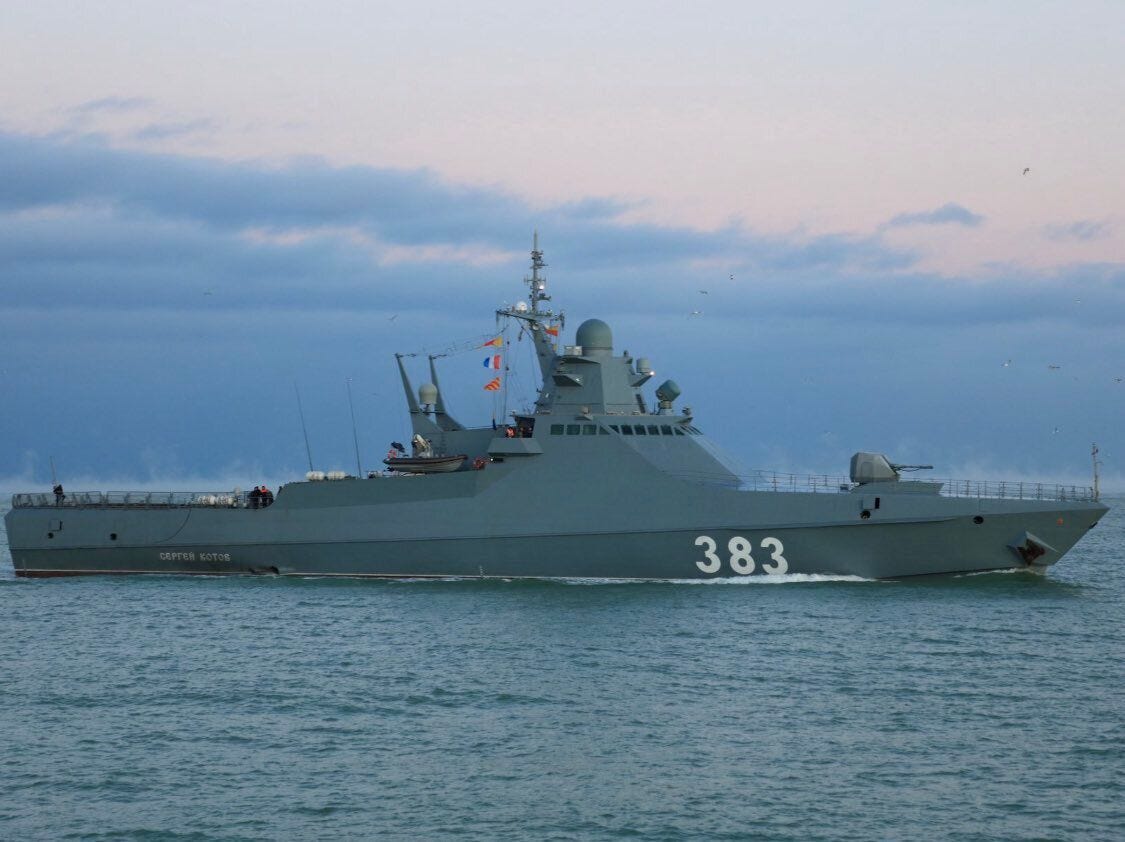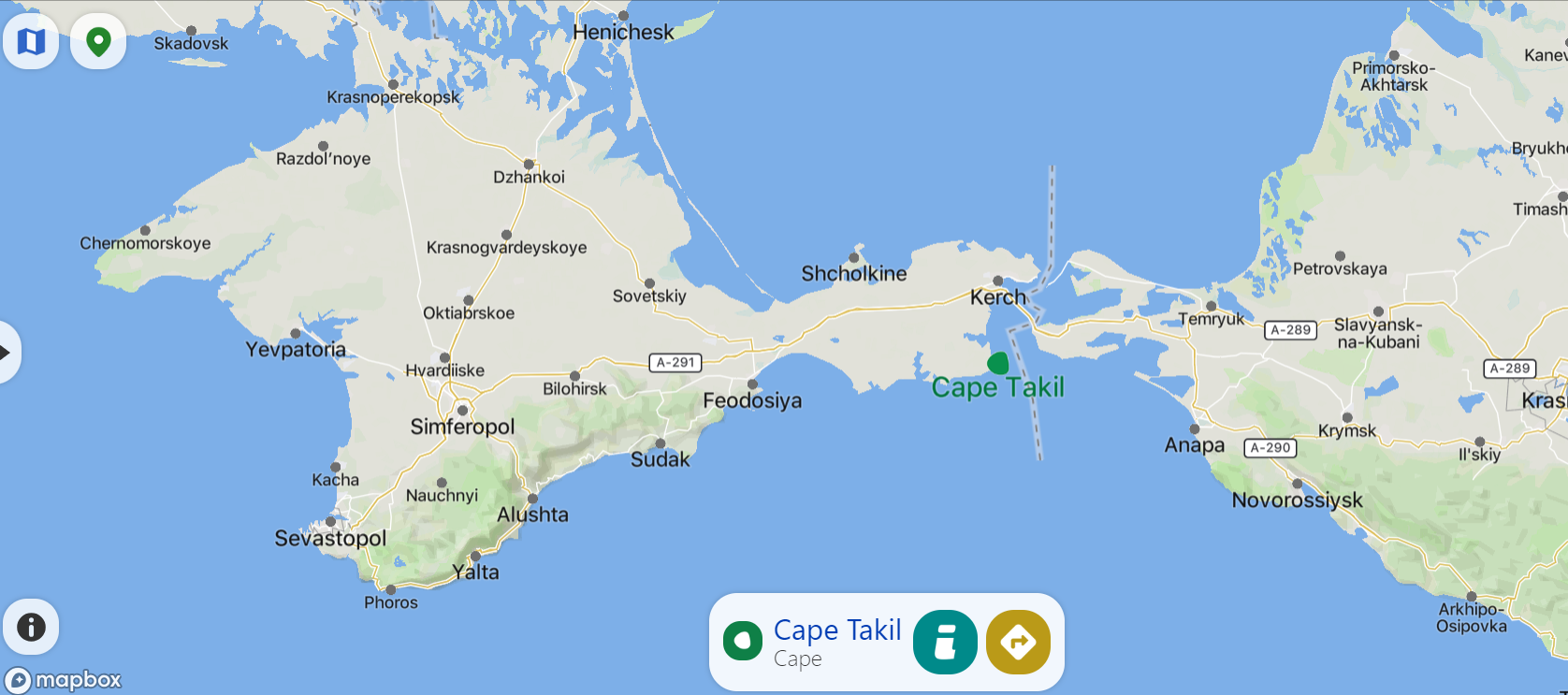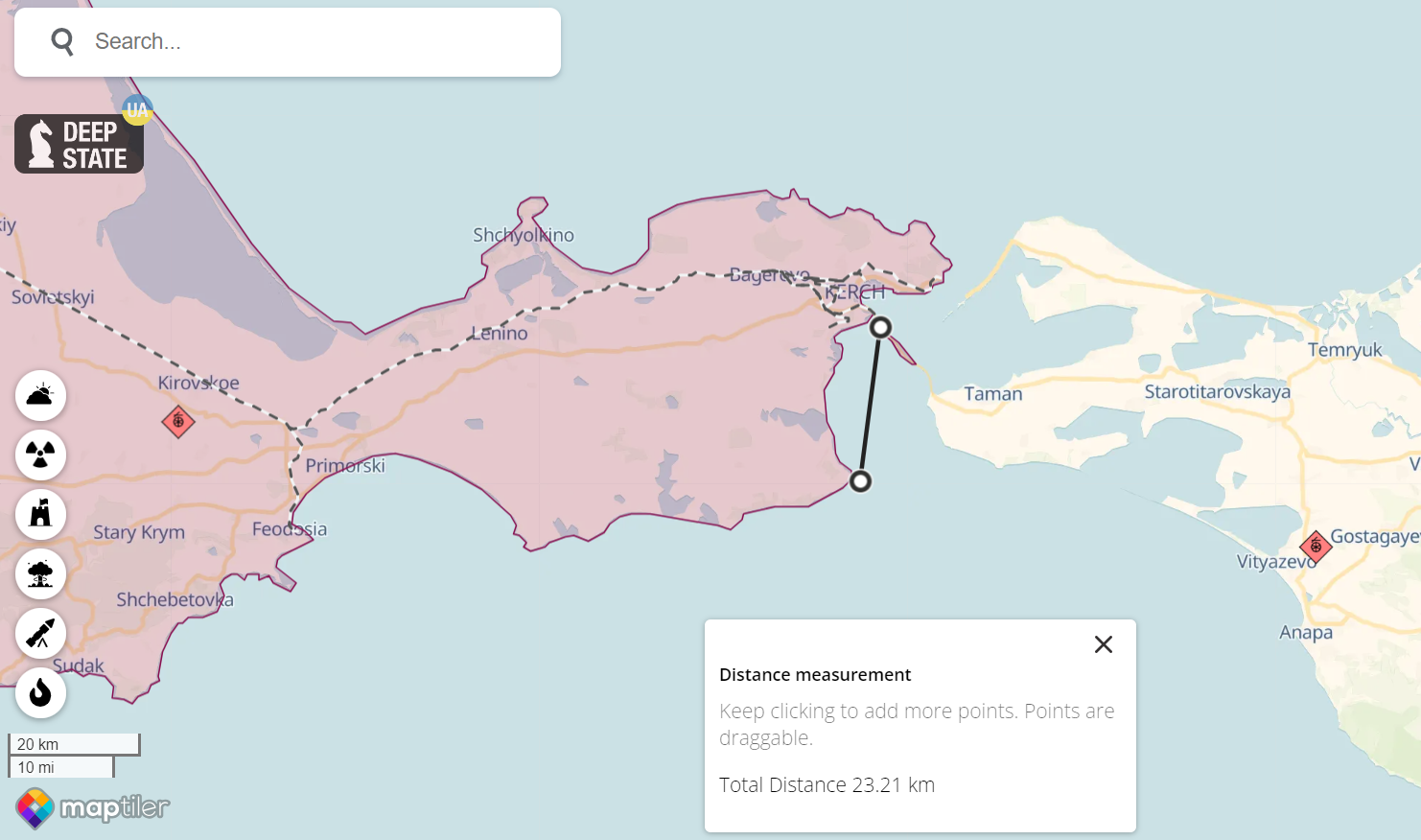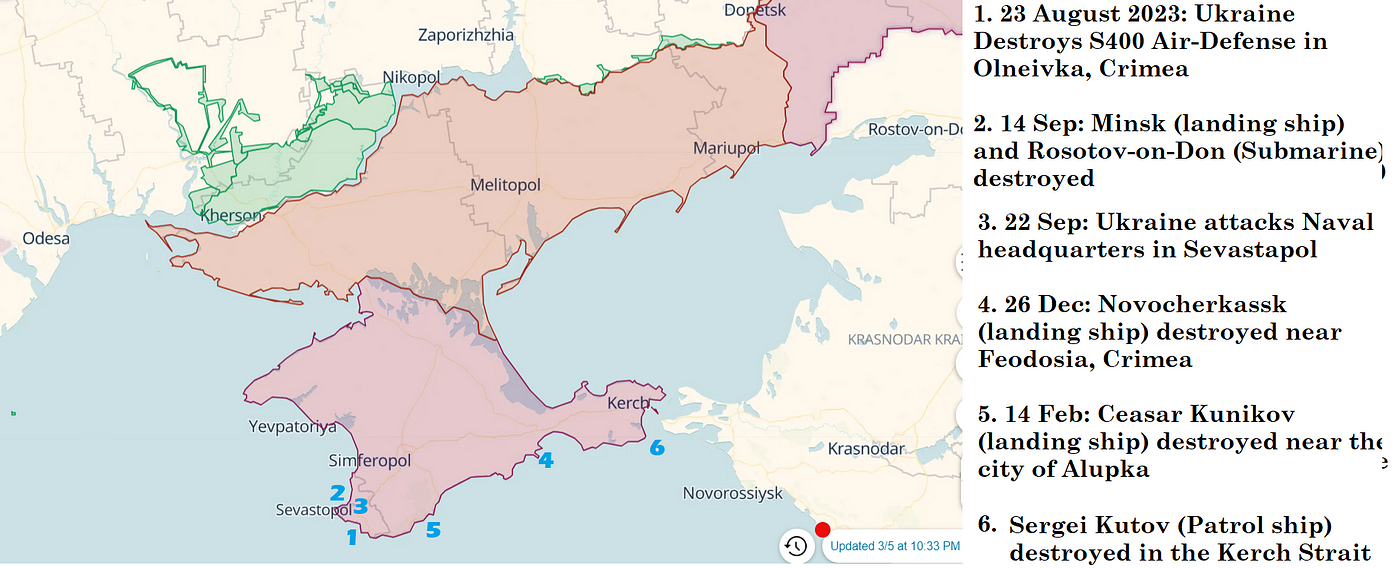Ukraine Sets the Stage to Hit the Kerch Bridge
Sails into the Kerch Strait for the first time since the start of the war.

The situation on the battlefield in Ukraine remains highly fluid and dynamic. While this has been the case for some time, the pace of change appears to be accelerating even further.
Both sides, Russia and Ukraine are acutely aware of each other’s strengths and weaknesses. Every strategic action does evoke some form of strategic response from the other side. After the Russians slowed down their fighter jet sorties over the frontline to avoid further losses, Ukraine made a quick pivot to take the attack to the Russian Black Sea Fleet.
I believe we should reconsider how we classify Ukraine’s actions against Russian military targets. Rather than categorizing attacks on specific entities like the Russian air force, Black Sea Fleet, or ground installations separately, it might be more appropriate to encompass them under the broader term of “Russian high-value assets.”
Russia’s array of high-value assets, including critical weaponry and equipment, remains highly vulnerable. Russian forces must remain vigilant to safeguard these hard to replace units within the theater of conflict. Any perceived vulnerability will allow Ukraine to exploit it and target these assets.
What motivates the Ukrainians to take these actions? They aim to prevent the Russians from having any opportunity to catch their breath.
From Ukraine’s perspective, they do not want the Russians to have a quiet night. It helps to keep reminding them that if we do not do something today, we are going to do something tomorrow.
It is psyops.
It helps.
This aids in keeping the threat assessment from the Russian end elevated, limiting their mobility, compelling them to spend time planning, depleting their resources, and maintaining pressure on them.
Yesterday, Multiple naval drones rammed into the Russian patrol ship Sergey Kutov, one of the newest additions to the Black Sea Fleet commissioned in 2021. It is estimated to have a value of around $65 million and with a crew of over 60.
The crew had a higher likelihood of surviving the attack because the ship sank in one of the busiest and most heavily protected corridors in the Black Sea, the Kerch Strait.


I have no idea how Ukraine managed to sneak multiple naval drones into the Kerch Strait, evade surveillance, and collide with a patrol ship of all things. Technically, a patrol ship should be the one protecting the fleet’s naval assets from hazards like naval drones.
Take a look at how busy, well-lit, and crowded the area where the patrol ship was sunk.
How did the drones get there? Did they travel all the way from Ukrainian shores, or did Ukraine launch them from boats in the sea, or did Ukrainian partisans do it from inside Crimea? I have no idea. Neither does the Russian high command. If they had any idea, this would have never happened.
Whatever the source location of the launch, this attack would have triggered the 3 am alarm inside the Kremlin. A patrol ship, most likely on guard duty at the southern entrance of the Kerch Strait, was sunk by Ukraine’s naval drones.
You can calculate where this is headed.
As soon I saw the attack video, people were saying it was the Kerch strait. I could not believe it. I thought it could be some where near the Port of Feodosia, where Ukraine had attacked and sunk another ship in late December. As time passed, it became clear it was indeed the Kerch strait. The spot where the ship sank is less than 30 kilometers from the Kerch bridge.
My immediate response after realizing where Sergey Kutov sunk was…
Holy Shit!
Will Ukraine launch a direct attack on the Kerch Bridge?
Some day.
They are working their way towards that goal.

The Kerch Bridge is Russia’s highest value asset in occupied territory. If Ukraine targets a portfolio of high-value assets, then the Kerch Bridge will be perched at the top of that list. As Ukraine continues to take down Russia’s high-value assets, such as fighter jets and ships in the Black Sea Fleet, the protective cover over the Kerch Bridge will continue to weaken. This isn’t a bridge that can be protected solely by manning its length and breadth with soldiers armed with automatic rifles.
You need air defense systems, patrol boats, radar, and communication systems. You need underwater surveillance. It’s an expensive bridge, requiring expensive protection. You can’t take it down in one day. It can be compromised by eroding its protective cover.
The fight for the Black Sea, which began in June last year, has circled all the way from Snake Island at the westernmost end of the Black Sea to reach the Kerch Strait in March 2024.
Media reports suggest that the Russian Black Sea Fleet has decreased by a quarter of its capacity, with some speculating it’s even more. I can’t confirm. What I do know is that Ukraine has been sinking one or two Russian ships every month since June last year. The Russian Black Sea Fleet has been pushed into a corner, now operating mainly in the eastern Black Sea. Most of their operations are focused in and around the Kerch Bridge.
Now, Ukraine has thrown a huge gauntlet at the Russian Navy. We are ready to strike in the Kerch Strait. Are you prepared to defend yourselves?
President Zelensky took his time to rub it in:
“Today, I would like to thank all of our warriors and units who are restoring security and Ukraine’s control over our skies and the Black Sea. Ukraine has already proven its capabilities and strength. The number of destroyed Russian aircraft, as well as our warriors’ achievements against the Russian fleet, serve as proof of this.
There are no safe harbors for Russian terrorists in the Black Sea. And there will be none. Just as there will be no safe space in the skies for them if Ukraine has sufficient strength”.
He should do this more often. The President of Russia likes to refer to nations full of people with derogatory pronouns as he sees fit. He does not have the authority to annoy others. So, whenever there is an opportunity to put him and his army in their rightful place, the Western world needs to seize it.
Words do matter, and the best approach would be to let them follow your actions rather than precede them.
There are no safe harbors for Russians in the Black Sea
It feels like the President is hinting that the Russians can expect the arrival of naval drones in the Russian port of Novorossiya. Or maybe the British Storm Shadow/French SCALP missiles.
I don’t think Ukraine will stick to just naval drones to hit the Russian Black Sea Fleet. They will mix it up with air-to-ship attacks using their long-range missiles. It offers them flexibility in targeting while making a mess out of any contingency plan the Russians come up with.
I really can’t see a way out for the Russian navy.
This isn’t just a problem for the Russian navy. It’s going to be a problem for all navies around the world. It’s just that Russia stuck its nose into someone else’s house and is now getting punched repeatedly and furiously with an innovative hand.
The Russian navy cannot innovate its way out of trouble, especially not in the middle of a war. The patrol ship did try to shoot down the drones, but it came up against a swarm moving towards it at an alarming speed from multiple directions.
This is a lopsided battle where David has more reasons to come out on top than Goliath. And David has a few more reasons to be positive about his future than Goliath does.
The Czech-led effort to procure nearly a million artillery shells for Ukraine is very close to securing the required funding, or by the time you are reading this story, the funding could have been secured. The Czech President has stated that he has identified the sources, and delivery can be made within weeks if funding is arranged. Ukraine’s ammunition-starved frontline troops may finally end their hunger.
I have saved the best one for the last.
French President Emmanuel Macron shows no signs of slowing down. France has agreed to participate in the Czech-led effort to procure shells for Ukraine. While speaking to the media in Prague yesterday, Macron laid out in a very clear manner why self-imposed redlines are a mistake:
“Who launched the war in Ukraine? Vladimir Putin. Who threatens us, whatever we do whatever we say, with nuclear weapons? President Putin. If every day we explain what our limits are in the face of someone who has none and launched this war, I can already tell you that the spirit of defeat is there lurking. Not amongst us.”
He is talking, while also backing it up with actions.
The way Western media covers the war against Ukraine has gone off-track. As a result, I have decided to make my Ukraine stories public, without placing them behind the paywall.
Russian operational losses from 24.02.22 to 06.03.24
Personnel - almost 420,270 people (+1,250);
Tanks - 6,678 (+21);
Armored combat vehicles – 12,728 (+40);
Artillery systems – 10,308 (+50);
Multiple rocket launchers (MLRS) - 1,008 (+1);
Anti-aircraft warfare systems - 701 (+1);
Vehicles and fuel tanks – 13,479 (+56);
Aircraft - 347 (0);
Helicopters – 325 (0);
UAV operational and tactical level – 7,921 (+58);
Intercepted cruise missiles - 1,918 (+1);
Boats/ships – 27 (+1).